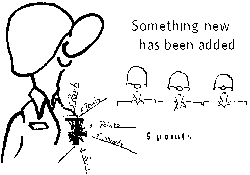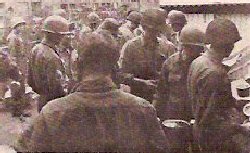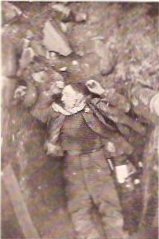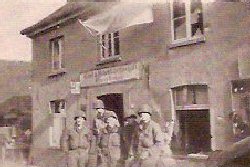| History - 49th A.I.B. - Company 'B' |
 | Index
|
| Index
| | Next |
| Next |
|
(Pages 25-28)
|
11 March (con't)
vigor and brought almost devastating results. In the evenings there were movies, at our home made theatre, which were very well attended both by military and civilian personnel. Two days after we got settled in Venlo, P. X. rations came in and included in their contents cokes, which we had not had since England. One day we attended a battalion formation in which awards were given to some of the men that had distinguished themselves in the previous battles. General Devine made the awards. This was all repeated a few days later for another group of worthy men.
It was in Venlo that a shift in our officers was made. Lt. Cone was transferred to Co. A, and Lt. Clement joined us coming from the 2nd Armored Division. Here too, promotions were presented. S/Sgt. Ralph 5atava was promoted to T/Sgt., Pvt. John O'Donnel and Sgt. Gerald Nolan were promoted to S/Sgt., Pvt. Chester Hobbs, Pfc. Richard Brown, and Pfc. Clifford Dale were made Sgt., Pfc. Jim Dedecker was advanced to Cpl., and Pfc.s Robert Kametz and Leonard Hensley, both drivers, were made T/5.
Hosea Arnett, Frank Sposito, Irving Davis, and Andy Triano returned from the hospital, while Joel Parrott and William Carasik left on

|

a month's furlough to England. The company was brought up to strength again with 49 men from the 'Repple depple'.
We all watched the news very closely, and were pleased that General Patton was moving so fast, and then news came that the I H Army had crossed the Rhine River on the Remagen Bridge, and that the 3rd Army had also crossed. Finally one day weird rumors came floating around that we were due to cross the Rhine and go tearing hell-bent towards Berlin. In fact we were due in Berlin in two weeks. Well, the rumors came true in a miniature sort of a way. We did leave Venlo March 26th, at 2327, but in two weeks time there was still plenty of fighting to be done before Berlin was captured.
26, 27 March
The company was alerted and moved out, destination Berlin. All night we traveled, trying to get a little shut eye, storing up sleep for an uncertain future. Kraut planes were overhead, and searchlights played through the sky, but there were no attacks. We passed through one of our old battle grounds, at Lintfort, and crossed the Congo Bridge about 8 Km. south of Wesel at about 0700. Once across the Rhine, we bivouacked, rested, built fires, and got a good hot chow. The total trip was 37 miles. Later in the day We found billets and stayed In them for the night.
|
-- 25 --
|

28 March
At 0900 we moved five miles, to Bruckhausen, north of Dinslaken, and bivouacked in a wooded area. We were in support of CCA at that time, and most of us sunned ourselves and slept a major share of the day, but not Bill Glass. He read a book called 'Berlin Olympic Games' for his relaxation. That night some of us dug slit trenches to sleep in, and others said, 'To hell whit it!' The 'to-hell-whits-Its' came out all right, because we moved again shortly after dark to spend the night in another wooded area a few miles distance.
29 March
Early In the morning we were on the move again. We had thought we would go mounted, but they surprised us, and we moved out on foot. We reached our objective, Dorsten, Germany around 0800. Dorsten was a mess. It had been hit so hard by bombers and artillery that it was little more than a tumbled pile of bricks. Dorsten was definitely "Kaput" as far as we could see. The long hike was wearying, especially for the men in the weapons squads who had to carry their machine guns and the radio men, Low, Thorpe, Carasik, and Langill, who had to follow energetic platoon leaders carrying the heavy 300 radios on their backs.
After much delay we were assigned to clear out certain areas. No enemy was found, and we moved into billets for the night, except for the third platoon,
|
who were stuck with the outpost detail, and dug in to protect the Engineers, who were building pontoon bridges across the Lippe Canal. During the day an occasional shell had fallen, and Pvt. Hugh Brunson had been slightly injured.
30 March
In the morning the fourth platoon relieved the third platoon, and the second platoon crossed the canal and set up a defense around that bridge. The rest of the company either slept or explored the rubble. Here Jim B. Smith's automatic kitchen crew of Boyles, Fischer, Kleczkowski, 'Baldi' Myers, Howe, Thobaben, Puffer, and Kiestler, fixed up hot chow and 'Mailbag' Epley brought up a welcome bunch of mail. Preparations were being made for a good night's sleep, when an alert came, and we got up to move out again. As we were getting ready, eight enemy planes appeared on the scene, and we tried out our 50s on them, but they apparently deemed us unworthy of notice,

|
-- 26 --
|
for they passed us by without even returning our fire. At 2300 we left Dorsten for Gladbeck, Germany, arriving at 2345. We moved into houses for a peaceful night's sleep while the artillery pounded the enemy positions. For once, blessedly, we received no return fire.
31 March
We arose rather late and as there was no immediate action for the day we spent our time cleaning up weapons, vehicles, and our own grimy selves. However, as we were lining up for chow that evening, orders were received to move out. We piled into the tracks and drove to Recklinghausen, where we parked along the road. We tried to serve chow again, but received orders to move out and never got to taste that chow at all that night. We heard our own artillery whistle over our heads as we drove through the night and through the rain.
1 April - Easter
We entered Wieman, Germany at 0730

|

and obtained billets. We spent a peaceful morning writing to our loved ones, for today was Easter Sunday, and our thoughts travelled back to other Easter Sundays, and to those with whom we had spent them. For most of us this was our first Easter away from the States. Church services were held in the afternoon. As we were on the alert, these services were short, but well attended. We moved at 1900, and after traveling for a short distance parked on a side road and spent the night sleeping in the tracks.
2 April
We started forward for Neuhaus, with the objective of taking and holding Paderborn. At 1120, a party going into Neuhaus to secure billets was ambushed, and several of the party were killed or wounded. S/Sgt.
Philly, who was our member of this party escaped without injury. Billeting plans were postponed for the time being. The reconnaissance made contact, and a pitched battle took place in the outskirts of town. It seemed that this supposedly captured territory was far from cleared.
We were committed at 1500, with a preliminary artillery barrage preparing the attack. We moved up both sides of the road, coming under artillery and harassed with small arms. Tanks were called up in support. The first platoon, lead element on the right side of the road, and the third platoon lead element on the left, reached a wide open field, and started
|
-- 27 --
|

across, the rest of the platoons following. About halfway across this field the enemy suddenly cut loose with a terrific hail of small arms fire, and we dove for what cover we could find In the shallow ditches alongside the road. They had caught us in a murderous cross-fire from rifles and machine guns.
The third platoon of 'B' Co. 36th Tanks came up to cover us, and at once drew artillery fire. The lead tank was hit and knocked out, and shrapnel added to the sniper fire to make the situation of the men caught in the field doubly critical. Lt. Bell withdrew his men to dig in for the night and wait for support. Obviously the krauts were well dug in, had plenty of support, and did not intend to give up without a good fight.
We set up an FPL that night, in preparation for a counter-attack that might come early In the morning. Co. A sustained a counter-attack at 0130, and we were alerted, prepared to come to their aid if the attack proved to be too strong. The counter attack was beaten off however, and there was no action on our front that night.
|
3 April
We moved out to the attack next morning, but held up, as the concentration of artillery could not immediately be brought to bear on the enemy. As we approached the area of the previous day's battle, we again came under intense small arms fire. We called for artillery again, and this time we got it. The barrage was terrific, as in addition to the artillery we had the tanks firing in direct support and our own mortar crews kept their mortar tubes hot pouring out shells. It was too much for the krauts. When the barrage lifted and we prepared to move forward in the attack, they came out with their hands up, showing unmistakable evidence of shock.
The foxholes and gun emplacements had been dug in commanding and completely controlling the field, and were manned by about 50% SS, and 50% Wehrmacht. There were two companies of SS troops, the 5th Viking and the 12th Hitler Jugend, and elements of the 15th Convalescent Regt., the 19th Panzer Pioneer Replacement Bn., and the 6th Panzer Jager Bn. They were bristling with weapons, machine guns, panzerfousts, and rifles. They also had a few American weapons, which made us a little mad.

|
-- 28 --
|